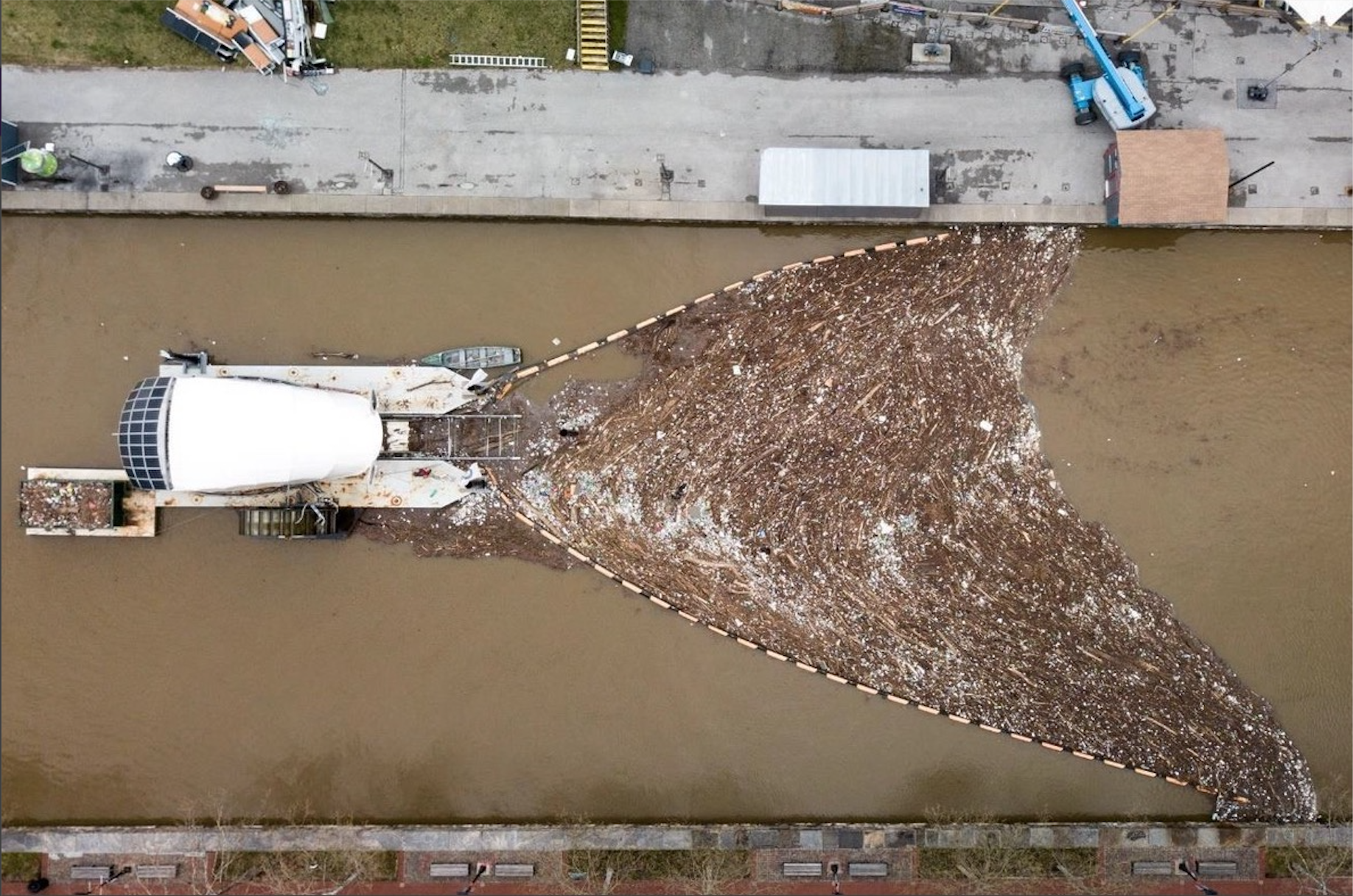When we think of marine plastics, our minds likely jump straight to the open ocean: turtles and seahorses swimming among refuse, or the Great Pacific Garbage Patch, itself. But how often do we think upstream in the literal sense?
The Benioff Ocean Initiative (BOI), a nonprofit under UC Santa Barbara, has done just that. In a white paper released in April 2019, BOI pointed out that 80% of marine pollution originates on land — as opposed to, say, abandoned fishing gear or trash from barges and boats. Furthermore, the paper explained that rivers are a key conduit for this waste, and the vast majority of our marine trash originates from just 20 countries. Uncovering this information gave BOI an idea about where one could target global cleanup efforts.
Aerial view of “Mr. Trash Wheel” river plastics intervener, Baltimore, MD (Clearwater Mills)
Now, BOI is putting their money where their mouth is. Just over a month ago, the organization released an RFP seeking interdisciplinary pilot projects for an innovative plastic waste capture system in any river in the world. The winning proposal will receive $3 million to develop and deploy their project, as part of a jointly-funded program between BOI and the Coca-Cola Foundation.
We at SeaHive spoke with Molly Morse, Project Scientist with BOI. In terms of geography, she said, “The RFP is pretty open-ended. The only guidance is that it can be any river in the world that will intercept plastic waste before it enters the ocean.” More important, the proposal should demonstrate that the team thought critically about what approach would be most effective for their chosen river and region. From a technical standpoint, this means understanding the hydrology of the river system: the river’s shape, width, flow rate, and so on. Furthermore, although the waste capture technology is the premise of the project, communication is a major component. The technology will be used to draw attention in the local community to the problem of plastic pollution. As such, outreach should be targeted toward the local culture. “For instance,” explained Molly, “if it’s in a communist country vs. a democratic country, do you target the public or the government and decision makers to change policies?”
One other key consideration is what will be done with the waste after it is collected. The program requires that the waste be captured and disposed of properly. Ideally, this means plastics will be recycled; However, BOI recognizes that some of these projects would be in areas without recycling capacity. Furthermore, plastics that have been sitting in water tend to be degraded, low-quality plastic that may not be recyclable. Some possible solutions have been to allocate project funds to building recycling capacity, or to conduct a brand audit to find out where these materials are coming from. BOI is allowing organizations to approach that part of the project however they would like, but it is something that needs to be addressed.
Plastic waste in the Mekong River (Shutterstock)
Given the interdisciplinary nature of this project, it is likely that the winning team will have a variety of key members involved — namely, an engineering specialist, an environmental or watershed scientist, and a relationship with the local government or key stakeholders in the region. It may seem that these are tall orders, but according to Molly, BOI has been talking to people on every continent except Australia and Antarctica about marine plastic solutions. “There are folks and organizations all over the world who are thinking about this,” Molly explained, “It’s encouraging to see how much thought, time, and design are going into finding solutions all around the world.”
The RFP deadline is July 12. The BOI team will be reviewing proposals for the following month or two, and a decision should be made by September on the winning project. The program will tentatively launch by the end of 2019 and continue over the next four years. If you’re interested in applying, you can do so here, and for more information email boi-contact@ucsb.edu.


